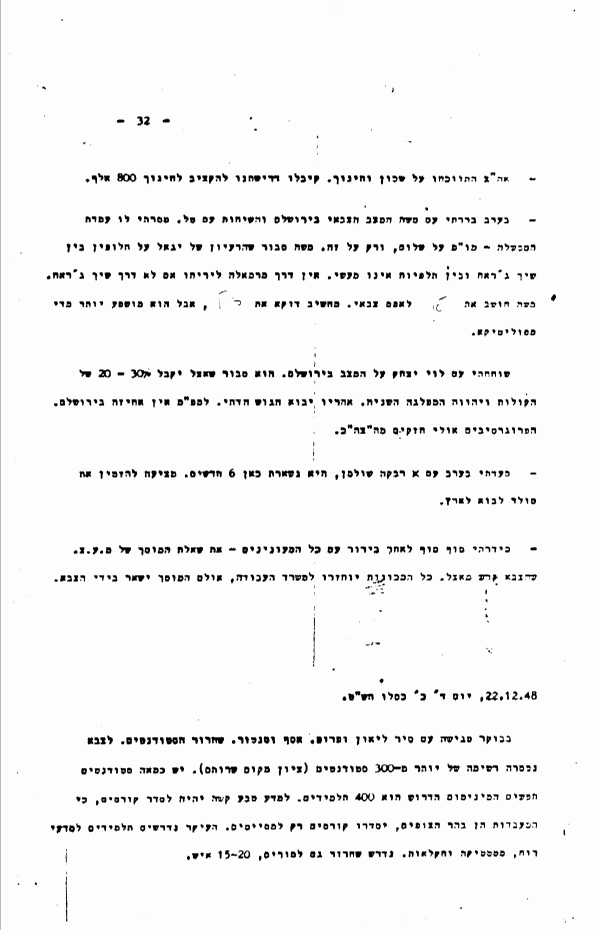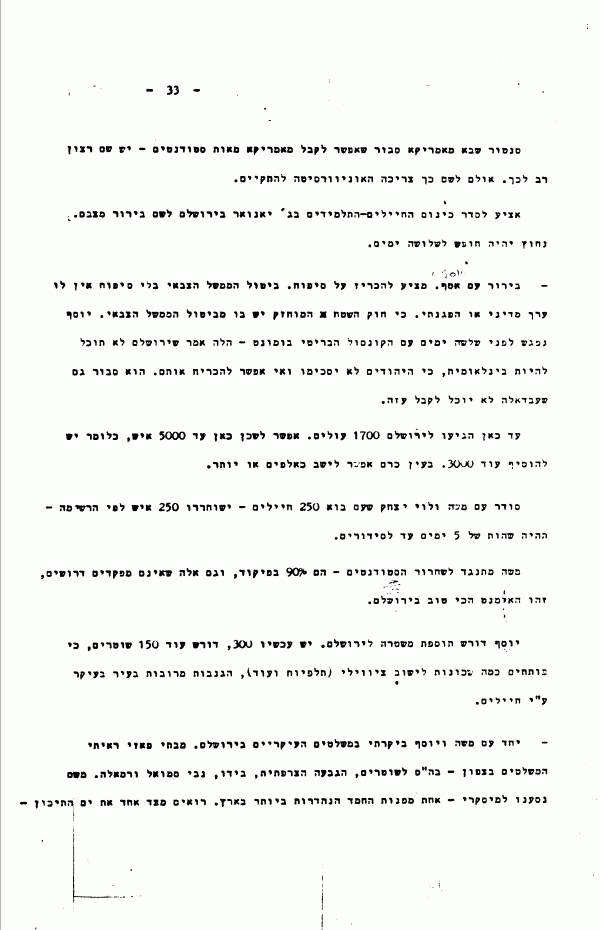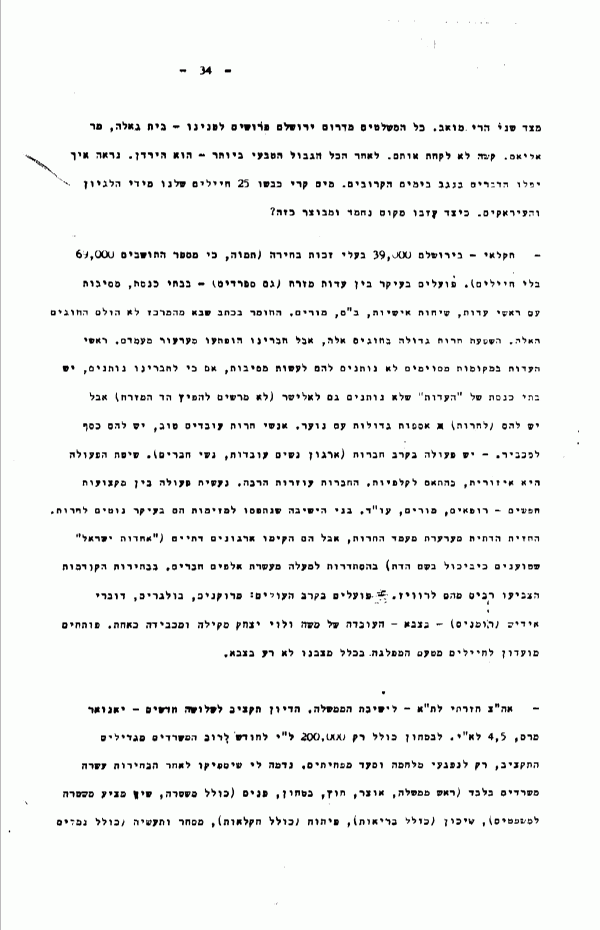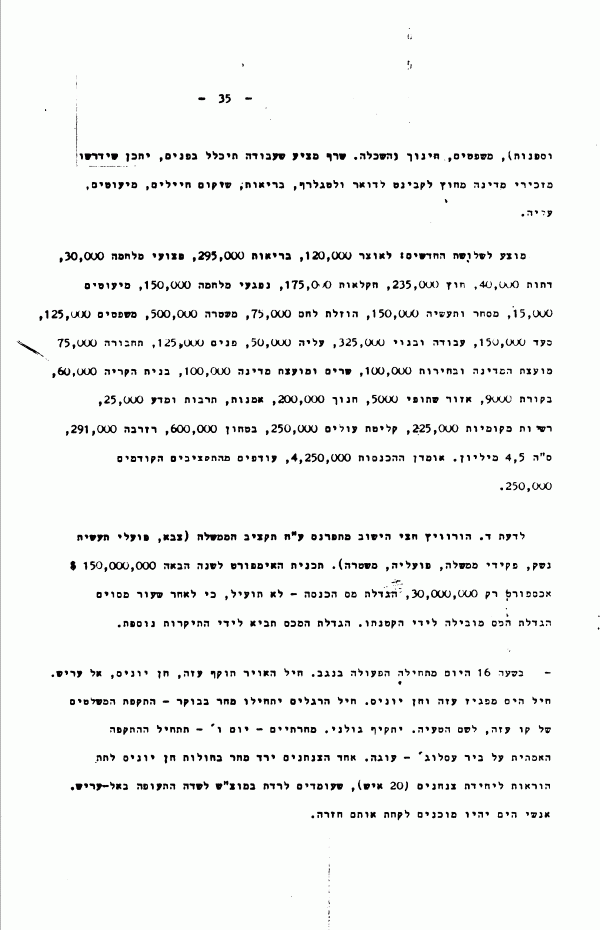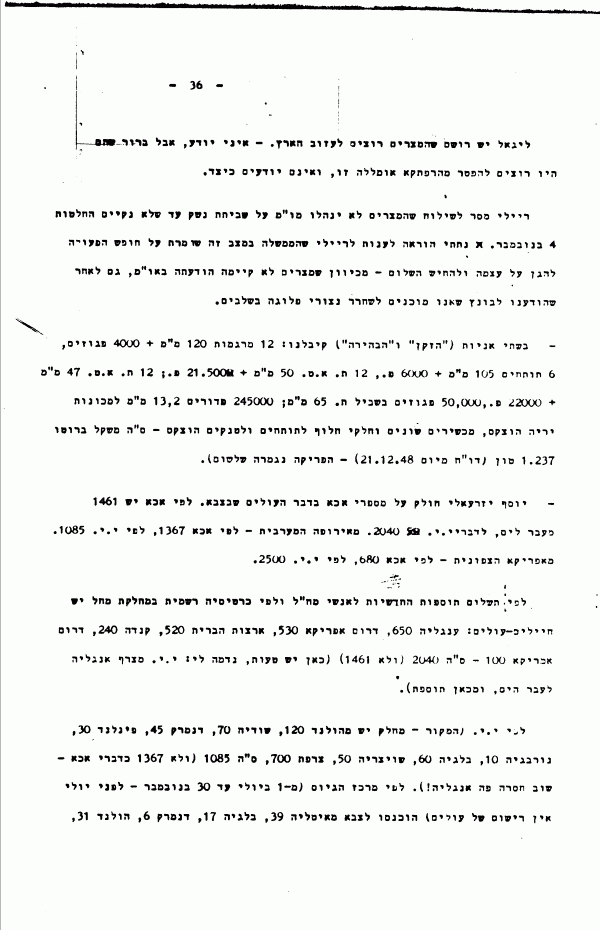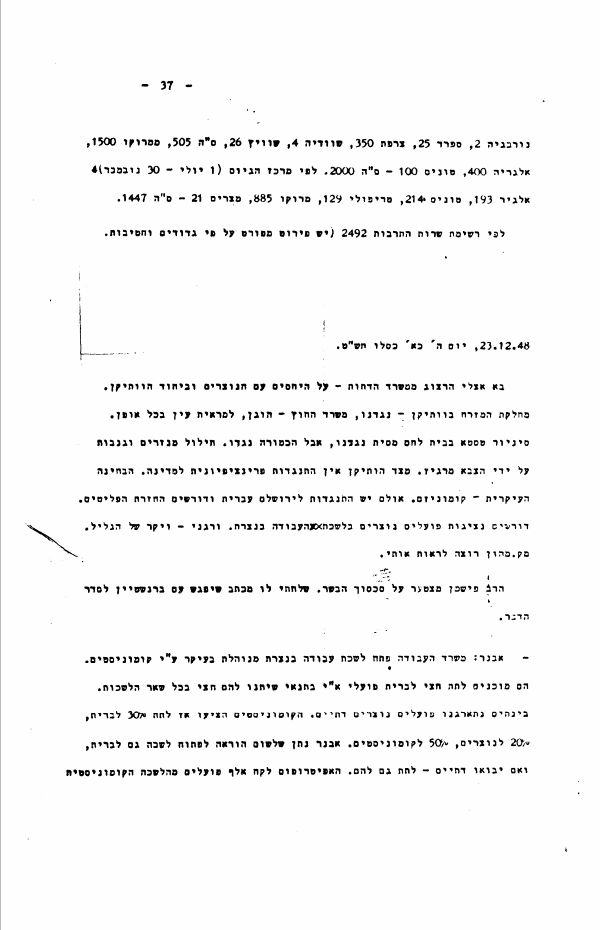1
of
Places:
United States
Gaza
Ayn Karim
Hakirya Tel-Aviv
England
ביר עסלוג'
Egypt
Canada
Belgium
Norway
France
Tripoli
Sweden
Switzerland
Jerusalem
Spain
People:
The use of the photograph is subject to the Copyright Law, 2007
22.12.1948
223451
Wednesday, December 22, 1948 [Jerusalem] In the morning a meeting with Sir Leon [Simon] and Prof. [Simcha] Assaf and [Werner] Senator [from the Hebrew University]: the release of students [from military service]. The army was given a list of more than 300 students (also noting where they are serving). There are about 100 exempted students; the minimum required is 400 students. For the natural sciences it will be hard to arrange courses, because the laboratories are on Mount Scopus. Courses will be arranged only for those who are graduating. It’s mainly humanities, mathematics, and agriculture students that are needed. Release [from military service] is also needed for teachers – 15-20 individuals. [Werner] Senator, who came from America, thinks it’s possible to get hundreds of students from America – there’s a strong interest in this over there. But for this the University has to exist. I’ll suggest organizing a gathering of soldier-students on January 3 in Jerusalem to clarify their status. A leave of three days will be necessary. – Consultation with [Dov] Yosef. He suggests declaring the annexation [of Jewish Jerusalem]. Terminating the military government without annexation has no political or declarative value, because the law on possessed land has the effect of terminating the military government. Yosef met three days ago with the British Consul Beaumont – who said that Jerusalem could not be international, because the Jews would not agree and they cannot be forced. He also thinks that Abdallah won’t be able to get Gaza. So far 1,700 immigrants have arrived in Jerusalem. Up to 5,000 people can be housed here; that is, 3,000 more should be placed here. About 2,000 or more can be settled in ‘Ein Kerem. It was arranged with Moshe [Dayan] and Yitzhak Levi that upon the arrival of 250 soldiers – 250 men would be released [from Jerusalem, for economic reasons] in accordance with the list; there will be an interval of five days for the arrangements. Moshe is opposed to the release of students – 90% of them are in command [positions], and even those who are not commanders are needed. They are the best in Jerusalem. Yosef demands additional police for Jerusalem. Currently there are 300, he demands another 150 policemen, because a number of neighborhoods are being opened up for civilian settlement (Talpiot, etc.). There are many thefts in the city, mainly by soldiers. – Along with Moshe and Yosef I visited the main strongholds in Jerusalem. From the Po’alei Agudas Israel houses I saw the strongholds in the north – the police academy, the French Hill, Biddu, Nebi Samwil, and Ramallah. From there we traveled to [Mount] Miss Carey [south of ‘Ein Kerem] – one of the most delightful spots in the country. From one side you see the Mediterranean Sea – from the other the hills of Moab. Although strongholds south of Jerusalem are spread out before us – Beit Jala, Mar Elias. It’s hard not to take them. After all, the most natural border is the Jordan [River]. We’ll see how things turn out in the Negev over the coming days. [Mount] Miss Carey was captured from the Legion and the Iraqis by 25 of our soldiers. How was it that they abandoned such a charming and fortified spot? – [Ze’ev] Haklai – in Jerusalem there are 39,000 eligible voters (puzzling, since there are 69,000 residents not counting soldiers). They’re working primarily among Mizrahi [Eastern] communities (also Sephardim) – through synagogues, gatherings with community leaders, personal conversations, schools, teachers. The written material, which comes from the [party?] center, isn’t suited to the circles. Herut has a lot of influence in the circles, but our [party] members were surprised by the challenge to their status. The community leaders in certain places don’t allow them to have gatherings, although they allow our members: there are synagogues belonging to “the communities” that also don’t give permission to [Eliyahu] Elyashar (don’t allow him to distribute [his newspaper] Hed Hamizrah), but Herut has large gatherings with young people. Herut members work well; they have plenty of money. Women members [of Mapai?] (working women’s organization, wives of [Mapai?] members) are active. Their mode of action is regional, based on polling stations. The women members are helping a lot. There’s activity among the free trades – doctors, teachers, lawyers. Yeshiva students who’ve latched onto policy [politics] are primarily inclined towards Herut. The religious front is challenging Herut’s status, but they established religious organizations (Ahdut Israel, who ostensibly speak in the name of religion). The Histadrut has more than 20,000 members. In the previous elections many of them voted for the Revisionists – they’re active among the immigrants: Moroccans, Bulgarians, Yiddish speakers (Romanians). In the army – the fact of [military command being in the hands of] Moshe [Dayan] and Yitzhak Levi makes things both easier and harder. They’re opening a club for soldiers on behalf of the party. Overall our situation in the army isn’t bad. [Tel Aviv] – In the afternoon I returned to Tel Aviv – to the government meeting. The discussion: the budget for three months – January-March P£ 4 .5 [million]. For overall defense only P£ 200,000 per month. For most ministries the budget is being increased; only for war afflicted and welfare is it being reduced. It seems to me that after the elections, 10 ministries will suffice (prime minister, finance, foreign [affairs], defense, interior (including police, [Ze’ev] Sherf proposes [merging] police into justice), housing (including health), development (including agriculture), trade and industry (including ports and shipping), justice, education[)]. Sherf suggests that labor be included in [the ministry of the] interior. It’s possible that there will be a need for state ministers [at the level of junior ministers, comparable to the British government system] outside of the cabinet – for post and telegraph, health, rehabilitation of soldiers, minorities, ‘aliya. Proposed [budget] for the three months: for finance 120,000, health 295,000, war wounded 30,000, religious [affairs] 40,000, foreign [affairs] 235,000, agriculture 175,000, war afflicted 150,000, minorities 15,000, trade and industry 150,000, lowering the cost of bread 75,000, police 500,000, justice 125,000, welfare 150,000, labor and construction 325,000, ‘aliya 50,000, interior 125,000, transportation 75,000, State Council and elections 100,000, ministers and State Council 100,000, construction of the Kirya [government compound] 60,000, oversight 9,000, cooperative area [?] 5,000, education 200,000, art, culture, and science 25,000, local authorities 225,000, immigrant absorption 250,000, defense 600,000, reserves 291,000, total 4.5 million. Estimated income 4,250,000, balance brought forward from previous budgets 250,000. In D. Horowitz’s opinion, half the Yishuv’s earns its income at the expense of the government budget (army, arms industry workers, government administrators and workers, police). The import plan for next year is $150 million, export is only 30 million. Raising income tax won’t help, because after a certain point raising taxes leads to its diminishment. Increasing duty fees will lead to further price hikes. – At 4 p.m. today the action in the Negev begins [Operation Horev]. The Air Force attacks Gaza, Khan Yunis, El-‘Arish. The Navy shells Gaza and Khan Yunis. Infantry will start tomorrow morning – an attack on the strongholds along the Gaza line, for the sake of deception. Golani will attack. The day after tomorrow – Friday [December 24] – the real attack [the main effort] will begin against Bir-‘Isluj – ‘Auja. One of the paratroopers will go down to the Khan Yunis sand dunes tomorrow to give instructions to a paratroopers unit (20 men), who will go down to the El-‘Arish airfield on Saturday night [December 25]. Navy men will be ready to take them back. Yiga[e]l [Allon? Yadin?] has the impression that the Egyptians want to leave the country. – I don’t know, but it’s clear that they would like to be done with this misadventure, and that they don’t know how. [General] Riley told [Reuven] Shiloah that the Egyptians won’t enter into negotiations on an armistice until we implement the [Security Council] decisions of November 4. I issued instructions to tell Riley in response that under these circumstances the government reserves the freedom of action to defend itself and call urgently for peace – because Egypt didn’t abide by its statement at the UN, even after we informed [Ralph] Bunche that we’re prepared to release the besieged [soldiers] in Faluja in stages. – Via two ships (Hazaken and Habhira) we received: 12 120 mm mortars + 4,000 shells, 6 105 mm cannons + 6,000 sh. [shells], 12 50 mm A.T. C. [anti-tank cannons] + 21,500 sh.; 12 47 mm A.T. C. + 22,000 sh., 50,000 shells for 65 mm C.; 245,000 13.2 mm rounds for Hotchkiss machine guns, various devices and spare parts for Hotchkiss cannons and tanks – total gross weight 1,237 tons (report from 21 December 1948 – the unloading was completed two days ago). – Yosef Yizraeli disputes the Personnel Department figures regarding immigrants in the army. According to the Personnel Department there are 1,461 overseas, according to Y.Y. 2,040. From Western Europe – according to the Personnel Department 1,367, according to Y.Y. 1,058. From North Africa – according to the Personnel Department 680, according to Y.Y. 2,500. Based on the supplemental payments for MAHAL members [volunteers from abroad] and according to the official registry in the MAHAL Department, there are immigrant soldiers [from]: England 650, South Africa 530, United States 520, Canada 240, South America 100, – total 2,040 (not 1,461) (there’s a mistake here, it seems to me: Y.Y. is including England with overseas, and this explains the higher number). According to Y.Y. (the source – MAHAL) there are 120 from Holland, Sweden 70, Denmark 45, Finland 30, Norway 10, Belgium 60, Switzerland 50, France 700, total 1,085 (not 1,367 as the Personnel Department states – again England is missing here!) According to the recruitment center (from July 1 to November 30 – before July there was no registry of immigrants) there are 39 recruits from Italy, Belgium 17, Denmark 6, Holland 31, Norway 2, Spain 25, France 350, Sweden 4 Switzerland 26, total 505, from Morocco 1,500, Algeria 400, Tunisia 100 – total 2,000. According to the recruitment center (July 1 – November 30), Algeria 193, Tunisia 214, Tripoli 129, Morocco 885, Egypt 21 – total 1,447. According to the Cultural Service list [there are] 2,492 (there’s a detailed listing by battalions and brigades).





